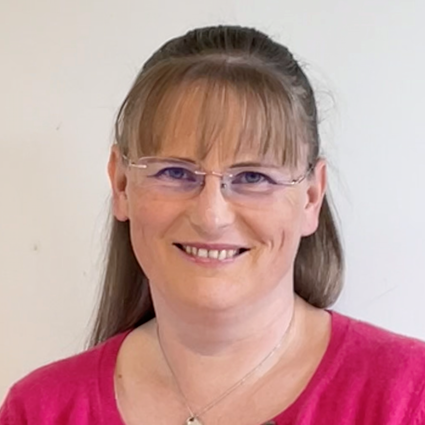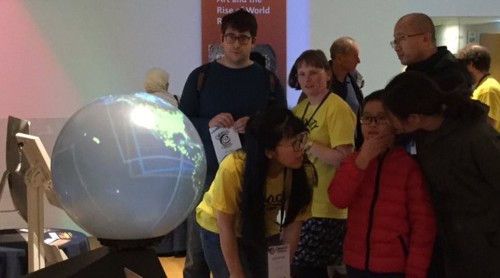Career Case Study - Sarah Sparrow - Associate Professor
Researcher Career Case Study

Associate Professor Sarah Sparrow
From PDRA to Associate Professor
Sarah joined the Oxford e-Research Centre 2016 as a Postdoctoral Research Associate with a DPhil in Atmospheric Physics. She is now an Associate Professor.
Sarah became aware of her own determination in her A-level physics class where she found herself in a group of fourteen boys and only two girls. The ‘two girls’ soon became just Sarah. Faced with suggestions that she was only interested in physics to be around the boys Sarah rose to the challenge. “It wasn’t about that at all. I wanted to do physics because I found it interesting and I had chosen it over my other strong subject which was music.” She passed her A-level Physics with an ‘A’ and went on to do a 4-year Integrated Masters in Chemistry and Molecular Physics at Nottingham.
Realising that she much preferred the Physics side of things, Sarah wondered what she should do next? Should she stay in academia or ‘join the real world and get a job?’ She took a chance and applied to Oxford to do a DPhil in Atmospheric Physics because she was interested in climate change.
“Am I good enough to do this?” she asked herself, “but what have I got to lose by just applying.” Her application was successful.
“After that I really didn’t have a clear idea of what I wanted to do except that it was a matter of earning money. I applied for a job that said it was doing consultancy, not realising that it was in fact in IT, working on databases for business management systems. I found myself doing bespoke programming.” This was the start of Sarah’s unusual career path in which she gathered a broad range of skills which would later prove to be useful.
Always open to a challenge, Sarah took up a multi-institutional postdoc position based in Imperial College London and Reading University. “It was good in that it meant I met a lot of people and grew my own very individual network across the different institutions.” During this time also, Sarah married and had her two children. Her postdoc, which had been extended to cover her maternity leave, eventually came to an end.
"Sometimes we have a tendency to undersell ourselves, expecting that if we work hard someone will notice. That’s not the case, you have to champion yourself a bit."
Again, at a crossroads, Sarah found herself under pressure, wanting to be with her children and needing to earn a living. “This was where a chance conversation came to the rescue through people I knew in Physics. I got a temporary position there and then a postdoc in geography working for Climatepredition.net."
“This was where the IT experience I had gained became useful. There was a disconnect between the science and the technical side of the project and I was someone who could talk to both sides."
"That experience enabled me to move across to the Oxford e-Research Centre and work with David (Professor David Wallom) as the technical co-ordinator for Climateprediction.net.”
In OeRC opportunities came up not only for co-ordination but also for outreach. “We had the chance to promote Climateprediction.net in the Curiosity Carnival in the Ashmolean Museum. We managed to get hold of a huge 3D globe projector which became a big talking point.”

Demonstrating the 3-D globe at the Curiosity Carnival, Ashmolean Museum
Sarah moved on to other projects including Climate Science and Services Partnership China and on the way she gained experience of running workshops, tutoring and training scientists to assess the impact of climate change on extreme weather.
“I was very fortunate in having such a supportive line manager in David. Sometimes we have a tendency to undersell ourselves, expecting that if we work hard someone will notice. That’s not the case, you have to champion yourself a bit, so having good support and encouragement is really important.”
“Some get funded, some don’t but sometimes the unsuccessful ones can be further developed and reformulated to be used again in a different kind of submission."
Not short of ideas for small projects, Sarah was able to use her contacts in Geography to get things going, and even reached out to the National Trust to see how Climateprediction.net could help. She gained experience in how to write proposals. “Some get funded, some don’t but sometimes the unsuccessful ones can be further developed and reformulated to be used again in a different kind of submission. This led on to me being invited to evaluate proposals for UK Research and Innovation, Agence Nationale de la Recherche (ANR) and the Swiss National Science Foundation.”
Opportunities for Sarah grew as she rose to new challenges. “As a result of successful funding, I learned to organise my own projects and I realised it was very useful and relevant to people to show how climate change affects them by looking at the impact. Recently I’ve now developed a new working relationship through the Climate Science for Services Partnership Brazil with Centro Nacional de Monitoramento e Alertas de Desastres Naturais (CEMADEN), the national disaster agency there. This year we’ve been running highly successful workshops in São José dos Campos.”
“A very big opportunity came for me when Oxford e-Research Centre launched the MSc in Energy Systems. They were looking for a Deputy Course Director. I’d built up a lot of trust with David over the years and with his support I was able to take this on with very successful results.”
“Sometimes an opportunity comes along that requires a bit more from you perhaps than your paid hours or role. It’s by taking up these opportunities that you’re going to get some progression within your career. It doesn’t come from saying ‘no’.”
"You don’t necessarily need to be an expert in either A or B, you just need to have the vision that A and B will go together and know enough about both to talk to all the people involved.”
“My experience in research, teaching, and good citizenship opened up the possibility of applying for an Associate Professorship and David encouraged me to go for it. It’s not just about your research portfolio. It was quite an effort to prioritise the paperwork at a very busy time but because over the years I’d taken such a different and varied route, I had much I could use as evidence for the ‘three pillars’ (research, teaching and good citizenship) required for an academic position. So for anyone who wants to be considered for an associate professorship, you need evidence to support those three pillars, and to be thinking about how you can develop yourself in those three areas.”
“All in all, I wouldn’t say I had a well mapped our career path or a ten-year plan. I said ‘OK, I’m doing this, I’m enjoying this and here’s another opportunity. I’ll make this work somehow.’ You don’t necessarily need to be an expert in either A or B, you just need to have the vision that A and B will go together and know enough about both to talk to all the people involved.”
